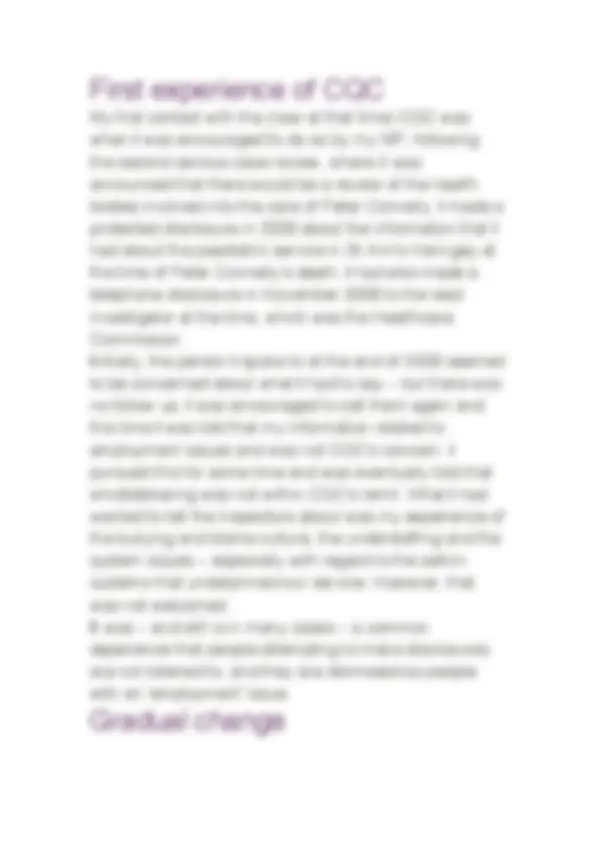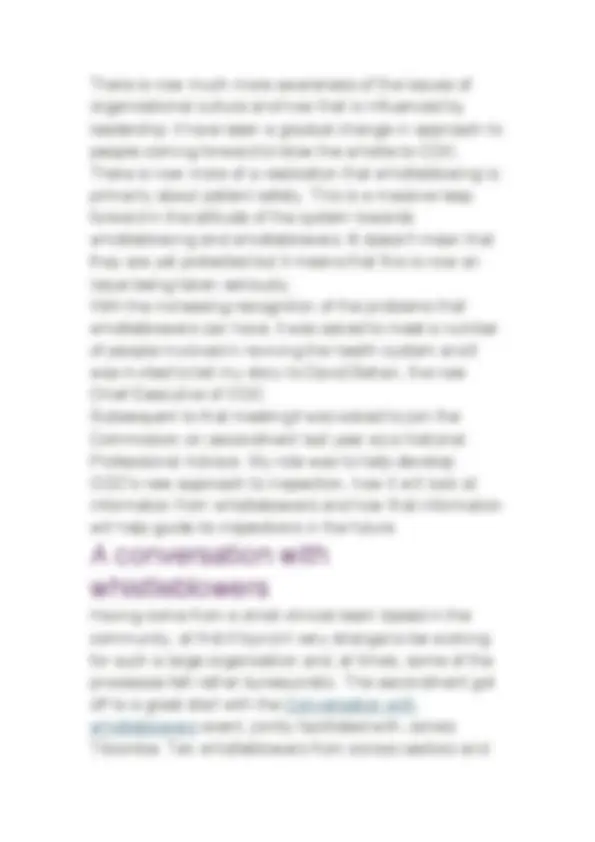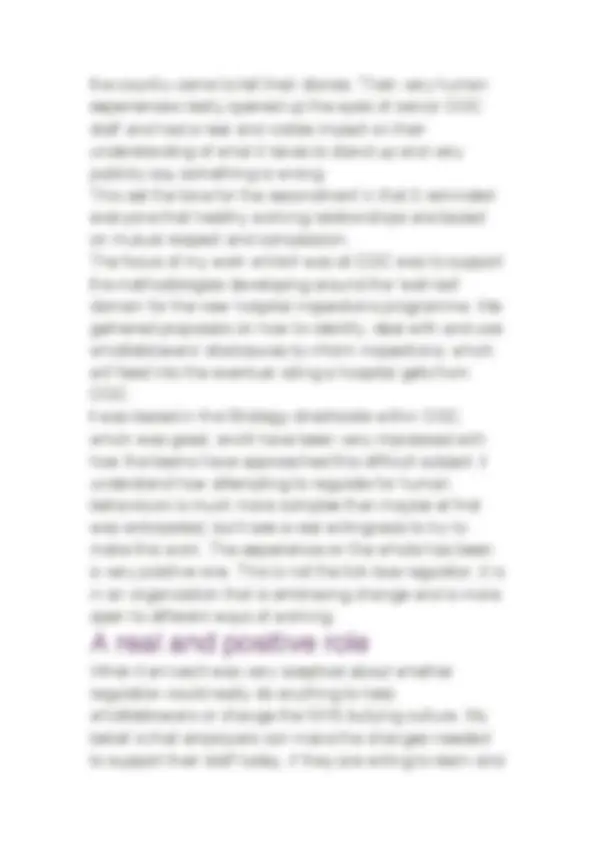





Study with the several resources on Docsity

Earn points by helping other students or get them with a premium plan


Prepare for your exams
Study with the several resources on Docsity

Earn points to download
Earn points by helping other students or get them with a premium plan
Community
Ask the community for help and clear up your study doubts
Discover the best universities in your country according to Docsity users
Free resources
Download our free guides on studying techniques, anxiety management strategies, and thesis advice from Docsity tutors
Dr Kim Holt shares her experiences of raising concerns in the NHS and working with the Care Quality Commission (CQC) as a whistleblower. her encounters with unsafe workloads, bullying and blame culture, and the importance of patient safety. It also highlights the gradual change in approach towards whistleblowing and the impact of her story on CQC's new approach to inspections.
What you will learn
Typology: Study notes
1 / 7

This page cannot be seen from the preview
Don't miss anything!




Published: 16 February 2015 Blog author: Dr Kim Holt Categories:
My story as a whistleblower starts in Haringey between 2004 and 2006. I was working as a consultant paediatrician for Great Ormond Street, who had taken over children's community health services in Haringey. The team I was working with had been raising concerns about systemic issues, including 61 clinical incident reports – which is a significant number. These were for things such as notes unavailable for clinic, children not booked in in a timely way, waiting times and lack of follow-ups. It was becoming a situation that was extremely concerning.
At the same time, two paediatrician colleagues resigned, halving the consultant team, which meant that our workloads became increasingly unsafe. It was at this time that I was targeted by management, for raising these concerns. Having experienced isolation, criticism and largely having my concerns ignored, I ended up going off sick in February 2007. Unfortunately that left the one consultant covering, who also went on sick leave for a short time, and a locum – Dr Sabah Al-Zayyat – covering the workload. Peter Connelly was seen in August 2007 by Dr Al-Zayyat, who missed the true situation of child abuse – although she had to see him with no notes. He was then tragically killed by his carers two days later. When a Royal College assessment took place in 2008 (around the events of his death), it concluded that the service in Haringey was clinically unsafe. In the meantime I was being told that the service was safe and that it was only me who had concerns. I ended up leaving my post later that year after having refused a settlement and refusing to sign a compromise agreement with confidentiality clause. In 2011, after the release of the Sibert report, my concerns were fully vindicated and I was able to return to my post. I also received an apology from Great Ormond Street Hospital. I have campaigned hard on the misuse of confidentiality clauses and was pleased that these are now recognised as contrary to good whistleblowing practice.
There is now much more awareness of the issues of organisational culture and how that is influenced by leadership. I have seen a gradual change in approach to people coming forward to blow the whistle to CQC. There is now more of a realisation that whistleblowing is primarily about patient safety. This is a massive leap forward in the attitude of the system towards whistleblowing and whistleblowers. It doesn't mean that they are yet protected but it means that this is now an issue being taken seriously. With the increasing recognition of the problems that whistleblowers can have, I was asked to meet a number of people involved in reviving the health system and I was invited to tell my story to David Behan, the new Chief Executive of CQC. Subsequent to that meeting I was asked to join the Commission on secondment last year as a National Professional Advisor. My role was to help develop CQC's new approach to inspection, how it will look at information from whistlebowers and how that information will help guide its inspections in the future.
Having come from a small clinical team based in the community, at first I found it very strange to be working for such a large organisation and, at times, some of the processes felt rather bureaucratic. The secondment got off to a great start with the Conversation with whistleblowers event, jointly facilitated with James Titcombe. Ten whistleblowers from across sectors and
the country came to tell their stories. Their very human experiences really opened up the eyes of senior CQC staff and had a real and visible impact on their understanding of what it takes to stand up and very publicly say something is wrong. This set the tone for the secondment in that it reminded everyone that healthy working relationships are based on mutual respect and compassion. The focus of my work while I was at CQC was to support the methodologies developing around the 'well-led' domain for the new hospital inspections programme. We gathered proposals on how to identify, deal with and use whistleblowers' disclosures to inform inspections, which will feed into the eventual rating a hospital gets from CQC. I was based in the Strategy directorate within CQC, which was great, and I have been very impressed with how the teams have approached this difficult subject. I understand how attempting to regulate for human behaviours is much more complex than maybe at first was anticipated, but I see a real willingness to try to make this work. The experience on the whole has been a very positive one. This is not the tick-box regulator; it is in an organisation that is embracing change and is more open to different ways of working.
When I arrived I was very sceptical about whether regulation could really do anything to help whistleblowers or change the NHS bullying culture. My belief is that employers can make the changes needed to support their staff today, if they are willing to learn and
intimidation and victimisation" of whistleblowers, I am worried that the same behaviours will persist. My reason for being so concerned is that, as we speak, individuals are facing loss of employment, are at risk of losing their homes, and their health is suffering. There has been a great injustice to so many people, and I am not sure that we have really understood the level of harm that has been experienced by both staff and patients. Unless historic cases are given an opportunity to have their stories heard and some form of redress is found for them, we will still feel uncertain about the future when speaking up. Although my secondment ended last year, I was involved in the evaluation of the work once the trials had been completed. I have been keeping a close eye on things as they develop at CQC; I have every faith in them – and that perhaps things can change for the better. Last updated: 16 February 2015